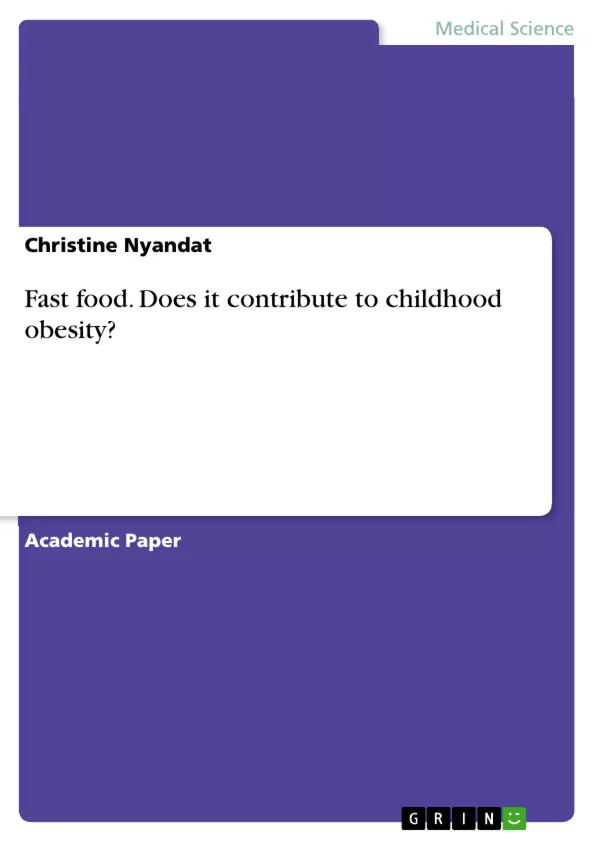This paper analyses whether fast food contributes to childhood obesity. Obesity is a multi-factorial disorder comprising genetic, dietary, conduct, and ecological components. The expanded eating of energy-dense poor nutrient diets with high saturated fats and sugar levels joined with diminished physical activity, have prompted high corpulence rates among kids. Current statistics depict that 15% of U.S kids and averagely 33% of adults are obsessed. The results in this new study support evidence that fast-foods adds to a high intake of calories and obesity risk in kids.
Table of Contents
- Introduction
- The Role of Fast Food Marketing in Childhood Obesity
- The Influence of Environment on Childhood Obesity
- Economic Factors and Childhood Obesity
- Dietary and Physical Activity Interventions
- The Impact of Fast Food on Health and Nutrition
- The Psychological Effects of Fast Food Consumption
- The Formation of Unhealthy Eating Habits
- The Convenience Factor of Fast Food
- Conclusion
Objectives and Key Themes
This paper investigates the relationship between fast food consumption and childhood obesity. It examines the various factors that contribute to this issue, including marketing strategies, environmental influences, economic considerations, and the nutritional impact of fast food.
- The impact of fast food marketing on children's eating habits
- The role of environment and accessibility to healthy food options in childhood obesity
- The influence of socioeconomic factors on fast food consumption and childhood obesity
- The nutritional consequences of fast food consumption on children's health
- The psychological effects of fast food consumption and its impact on long-term eating habits
Chapter Summaries
- Introduction: This chapter introduces the concept of childhood obesity as a multifactorial disorder and highlights the role of fast food consumption in its development.
- The Role of Fast Food Marketing in Childhood Obesity: This section explores how fast food companies target children through advertising campaigns, shaping their eating habits and influencing parental purchasing decisions.
- The Influence of Environment on Childhood Obesity: This chapter examines the impact of neighborhood food environments on children's access to healthy and unhealthy food options, highlighting the correlation between access to fast food restaurants and obesity rates.
- Economic Factors and Childhood Obesity: This chapter discusses the role of socioeconomic factors in childhood obesity, focusing on how financial constraints and limited access to healthy food can contribute to reliance on fast food options.
- Dietary and Physical Activity Interventions: This section explores potential interventions, including dietary modifications and physical activity programs, to mitigate the risk of childhood obesity.
- The Impact of Fast Food on Health and Nutrition: This chapter examines the nutritional composition of fast food, highlighting its high caloric content, unhealthy additives, and limited nutritional value, emphasizing the negative consequences on children's health.
- The Psychological Effects of Fast Food Consumption: This section delves into the psychological effects of fast food consumption, including the development of cravings, the impact on emotional well-being, and the potential for addiction-like behaviors.
- The Formation of Unhealthy Eating Habits: This chapter explores how early exposure to fast food can lead to the formation of unhealthy eating habits that can persist into adulthood, making it challenging to adopt healthier dietary choices.
- The Convenience Factor of Fast Food: This section discusses the convenience and affordability of fast food as key factors driving its consumption, highlighting how busy lifestyles and limited time can contribute to reliance on fast food options.
Keywords
The main focus of this paper is on the relationship between fast food consumption and childhood obesity. Key terms and concepts include fast food marketing, environmental influences, socioeconomic factors, nutritional composition of fast food, unhealthy eating habits, and the impact of fast food on health and well-being.
Frequently Asked Questions
Does fast food directly contribute to childhood obesity?
Yes, the study supports evidence that fast food leads to a high intake of calories and increases the risk of obesity in children due to high levels of saturated fats and sugars.
What are the current statistics on obesity in the U.S.?
Current statistics show that approximately 15% of children and about 33% of adults in the United States are considered obese.
How does marketing influence children's eating habits?
Fast food companies target children through aggressive advertising campaigns that shape their preferences and influence parental purchasing decisions from a young age.
What role does the environment play in childhood obesity?
The accessibility of healthy food options versus the high density of fast food restaurants in certain neighborhoods significantly affects children's dietary choices.
Are there economic factors involved in obesity rates?
Yes, socioeconomic factors like financial constraints often lead families to rely on affordable but nutrient-poor fast food options as a primary source of nutrition.
Can early exposure to fast food have long-term effects?
Yes, early exposure can lead to the formation of unhealthy eating habits and psychological cravings that persist into adulthood, making it difficult to switch to a healthy lifestyle later.
- Arbeit zitieren
- Christine Nyandat (Autor:in), 2019, Fast food. Does it contribute to childhood obesity?, München, GRIN Verlag, https://www.grin.com/document/502242



